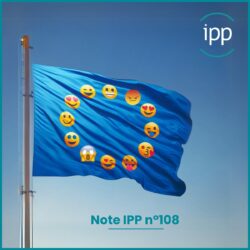>> Download policy brief
Cite
Emotional Rhetoric and the Rise of Populism in the European Parliament. Hugo Subtil, Vincent Verger. IPP Policy brief n°108. June 2024.
Presentation
This note relies on transcripts of debates held at plenary sessions of the European Parliament between 1999 and 2022. Automatic natural language processing methods are used to study the tone of interventions by MEPs. It appears that the tone of debates in the European Parliament is evolving. Their level of emotion has significantly increased since 1999. MEPs speak differently depending on the topics discussed, their country of origin, and their ideological positioning. The authors question the possible link between this increase in the level of emotion and the increase in the number of seats won by populist MPs.
Key results
- Contrary to the stereotype of an institution with cold and technocratic debates, the level of emotion has significantly increased over the period (+21%).
- Populist MEPs use more emotional rhetoric than other MEPs, with an average emotion score 10% higher.
- The choice of topics explains 25% of the emotional gap between populist and non-populist MPs,
and the addition of other factors (country of origin, age, gender) brings this explanation to 29%. - In response, non-populist MPs have shifted their speeches towards more emotion.
>> Read the note (version française)
>> Subscribe to receive future publications from the IPP Democracy Unit
Method and data
To quantify the emotional charge of MEPs’ speeches, authors relied on a database of 686,439 oral interventions and written questions formulated in plenary sessions between July 1999 and October 2022. This corpus is analyzed using automatic natural language processing tools. In particular, the emotion measure used in this analysis comes from the work of Gennaro and Ash (2022). This work uses a machine learning method known as “word embeddings”.
The definition of populism is inherently controversial The authors rely on a minimal definition of the concept of populism by political scientist Cas Mudde. According to this definition, populism is an ideology that sees political conflict as an opposition between two parties with irreconcilable interests: the “pure people” and the “corrupt elites” (Mudde, 2007).
In practice, they characterize populist parties using data from political science experts at the University of North Carolina at Chapel Hill (CHESS). This database allows you to situate the positions of political parties on numerous issues. The authors were particularly interested in the variable measuring the salience of anti-elite rhetoric in their platforms. They consider a party to be populist if the value of this variable is above a certain threshold. In the analysis presented here, this threshold corresponds to the highest decile of the anti-elite rhetoric salience score distribution.
>> See the list of parties considered populist in this note.
Authors
- Hugo SUBTIL is a post-doctoral fellow at IPZ, the political science laboratory of the University of Zurich.
- Vincent VERGER is a doctoral student at École polytechnique – CREST and affiliated doctoral student at IPP.
Ce message est également disponible en :  French
French



